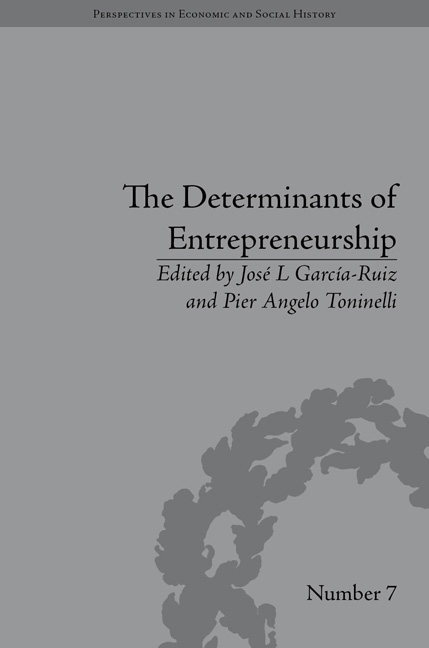Book contents
- Frontmatter
- CONTENTS
- List of Figures and Tables
- List of Contributors
- Introduction
- Part I Entrepreneurial Typologies
- Part II The Business Leaders
- 3 Italian Entrepreneurship: Conjectures and Evidence from a Historical Perspective
- 4 Entrepreneurship: A Comparative Approach
- 5 Dynasties and Associations in Entrepreneurship: An Approach through the Catalan Case
- Part III Culture or Institutions?
- Notes
- Works Cited
- Index
4 - Entrepreneurship: A Comparative Approach
from Part II - The Business Leaders
- Frontmatter
- CONTENTS
- List of Figures and Tables
- List of Contributors
- Introduction
- Part I Entrepreneurial Typologies
- Part II The Business Leaders
- 3 Italian Entrepreneurship: Conjectures and Evidence from a Historical Perspective
- 4 Entrepreneurship: A Comparative Approach
- 5 Dynasties and Associations in Entrepreneurship: An Approach through the Catalan Case
- Part III Culture or Institutions?
- Notes
- Works Cited
- Index
Summary
'The crucial theoretical problem [of the social sciences] is understanding the process of human learning'
Introduction
The role of the entrepreneur in economic development is well established since Schumpeter published his Theory of Economic Development almost a century ago (1911) and perhaps since Von Thünen wrote his Isolated Estate in 1826. One could even go back to Cantillon in 1755 and Adam Smith in 1776. Cantillon's definition of the entrepreneur is of remarkable modernity, as we will see later on. Entrepreneurial studies have been proliferating lately and a question which is cropping up oft en is: what moves entrepreneurs? Of course we know that the profit motive is the chief drive but our question here is a little more refined: what makes a successful entrepreneur? In other words: is it just a matter of genes, or drive, or calling, or are there more general factors (social, psychological) which move people to become entrepreneurs; and not only this: what makes entrepreneurs successful? We will argue (as Cantillon does, by the way) that almost everybody has played the role of entrepreneur at some moment or other. The question is, why are some successful and others not? What makes some behave in a certain way and others differently?
About these and somewhat related topics there has recently been debate among Spanish economic historians. One of us wrote years ago about ‘the weakness of the Spanish entrepreneurial spirit'.
- Type
- Chapter
- Information
- The Determinants of EntrepreneurshipLeadership, Culture, Institutions, pp. 81 - 104Publisher: Pickering & ChattoFirst published in: 2014

